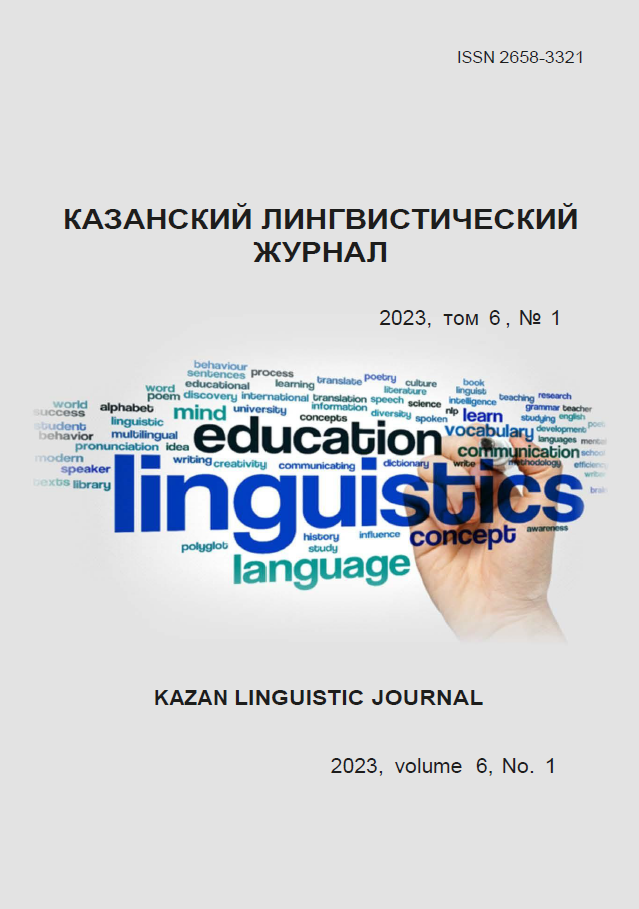Language representation of the results of the еlections in Italy in British, German and Italian mass media
https://doi.org/10.26907/2658-3321.2023.6.1.101-110
Keywords:
mass media text, parliamentary elections, “Brothers of Italy” party, Giorgia Meloni, language representationAbstract
The authors analyze the coverage of the results of the parliamentary elections in Italy in 2022 in reputable mass media in Great Britain, Germany, and Italy. The aim of the authors was to study the attitude of journalists in different countries towards the results of the elections. The journalist’s position on the covered event should be impartial. Nevertheless, the authors of articles on the results of the elections often use emotionally coloured evaluative vocabulary, grammatical constructions (for example, Konjunktiv, absolute superlative degree) and stylistic devices (metaphors, epithets, allusions) in order to represent it to the disadvantage of the party that won. The texts of the articles are marked by implicitly and quite often explicitly expressed aggressive tonality. The authors widely use quotations and refer to authoritative opinions, label people and facts and create threatening emotional images to make readers' mistrust the new government. In order to obtain their goal, namely to create an extremely negative image of Giorgia Meloni and the representatives of her party, the authors of the articles also select facts very carefully and use specific techniques to present information. The results of the research can be used to study newspaper texts and linguistics of discourse.
References
References
Fedotova L. N. Content-Analysis as a Tool in Sociology.Language of Mass Media as an Object of Interdisciplinary Studies. Part 2. M.: Izd-voMosk. un-ta; 2004. 416 p. (In Russ.)
Maslova E. Like Brothers. Post-fascists Took Office in Italy. Why Are They Considered Successors of Mussolini and Should We Be Afraid of Them? Available from: https://lenta.ru/articles/2022/10/08/it_conserv [accessed: 06.11.2022]. (In Russ.)
Clarke S., Voce A. Italian election 2022: live official results. The Guardian. 2022. Available from: https://www.theguardian.com/world/ng-interactive/2022/sep/25/italian-election-2022-live-official-results [accessed: 05.11.2022]. (In Eng.)
Italy election: who’s running, who will win, and why does it matter? The Guardian. 2022.Available from: https://www.theguardian.com/world/2022/sep/08/italy-election-analysis-far-right-brothers-of-italy-coalition-eu [accessed: 29.10.2022]. (In Eng.)
Radikale Rechtefeiert „Nacht des Stolzes“. Tagesschau. 2022. Available from: https://www.tagesschau.de/ausland/europa/wahl-italien-115.html [accessed: 20.10.2022]. (In Germ.)
Wieist der Rechtsruckbei der Italien-Wahl zuerklären? WDR. 2022. Available from: https://www1.wdr.de/nachrichten/italien-waehlt-neues-parlament-100.html [accessed: 21.10.2022]. (In Germ.)
Chi ha vinto le elezioni, come e perché: un'analisi finale. Agenzia Giornalistica Italia. 2022. Available from: https://www.agi.it/politica/news/2022-10-01/elezioni-politiche-risultati-analisi-youtrend-18277507/ [accessed: 08.11.2022]. (In Ital.)
Rechtsbündnis von Giorgia Meloni triumphiert. Deutchlandsfunk. 2022. Available from: https://www.deutschlandfunk.de/italienwahl-104.html [accessed: 23.10.2022]. (In Germ.)
Merlo G. Tornal’opposizione del “tanto peggio tanto meglio”? Huffpost. 2022. Available from: www.huffingtonpost.it/blog/2022/10/08/news/torna_lopposizione_del_tanto_peggio_tanto_meglio-10369633/[accessed: 17.10.2022]. (In Ital.)
Brothercentrist coalition. How the result of the Parliamentary elections in Italy frightened and delighted Europe. Kommersant. 2022. Available from: https://www.kommersant.ru/doc/5581981?ysclid=lev0r9wksm343678281[accessed: 04.03.2023].(In Russ.)
Lysakova I.P. Language of Newspaper and Typology of Press. Sociolinguistic Study. SPb.: Filologicheskij fakul’tet SPbGU; 2005. 256 p. (In Russ.)






